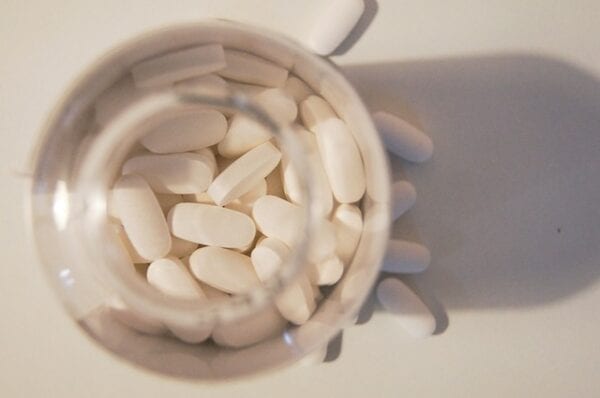The anticholinergic potassium interaction is noted on many databases as a serious interaction. Potassium supplements have been shown to cause irritation if left in contact with the GI tract for too long. Anticholinergic drugs may cause GI transit to slow down, which can cause potassium supplements to linger in the intestine. This can allow the supplements to irritate or even erode the lining of the GI tract. Enteric-coated potassium supplements were removed from the market in the 1960s due to intestinal damage. Solid potassium supplements now have slow-release mechanisms to prevent this GI irritation.
This interaction was documented in the 1970s when case reports were published showing patients who developed gastrointestinal lesions with slow-release KCl tablets. There has been a lack of studies in recent years to evaluate the effects of this interaction. A handful of studies were performed in the 1980s and 1990s that compared wax-matrix KCl and microencapsulated KCl to determine if lesions appeared. The used glycopyrrolate to simulate delayed gastric emptying. A study completed in 1984 showed that wax-matrix potassium supplements were associated with more lesions than microencapsulated KCl [7]. Patients who also received glycopyrrolate developed more lesions than those without. The clinical significance of these lesions is unknown, given that symptoms did not correlate with the severity of GI lesions. GI erosions were not found in patients receiving liquid KCl.
Potassium supplements have also been shown to also cause esophageal damage and even death in patients unable to swallow them properly. This has been seen more often in wax matrix or extended-release tablets than in powder or liquid formulations that are easier to swallow. Elderly patients have lower saliva production and declining esophageal motility, leading to a higher risk for esophageal injury. Elderly patients are also more likely to be hypokalemic due to medications causing potassium loss such as diuretics, laxatives, and corticosteroids, leading many elderly patients to be on potassium supplementation long term.
Any drug that lowers the GI transit time can pose a potential risk when taken with potassium supplements, given their propensity to irritate the GI lining. The severity of this interaction varies depending on the source. According to Micromedex, anticholinergics are contraindicated with solid potassium supplements due to the possibility that the supplement could arrest in the intestine and cause lesions. On the other hand, Lexicomp lists this interaction as moderate and states that agents with more anticholinergic effects pose a greater risk. Liquid or effervescent potassium supplements are potential alternatives, given that they have less propensity to arrest in the GI system.
Given a large number of drugs with anticholinergic properties, this interaction is quite significant. Here’s a link to a list of anticholinergic medications.
When assessing the anticholinergic potassium interation, there are a few important factors that I take into account. First, consider the anticholinergic burden. I’m a lot more concerned if a patient is taking amitriptyline and oxybutynin versus a patient who is only on a once-daily inhaled anticholinergic. Second, consider the dosing of any anticholinergic agent. Oxybutynin 2.5 mg daily is a lot less concerning than oxybutynin 30 mg per day. Next, I would make sure to assess if potassium is still necessary. I’ve encountered many cases where a diuretic has been discontinued and the patient no longer needed potassium. Lastly, review the dosage form of potassium and make a change if you feel that it is appropriate.
- 30 medication mistakes PDF
- 18+ Page Drug Interaction PDF
- 10 Commandments of Polypharmacy Webinar based on my experiences in clinical practice
The article was written by Melody Grafton in collaboration with Eric Christianson, PharmD, BCGP, BCPS
Study Materials and Resources For Healthcare Professionals and Students – Amazon Books
Anticholinergic potassium interaction References:
- McMahon FG, Ryan JR, Akdamar K, Ertan A. Effect of potassium chloride supplements on upper gastrointestinal mucosa. Clin Pharmacol Ther. 1984;35(6):852-855. [PubMed 6734038]
- Product Information: K-DUR(R) extended release tablets, potassium chloride extended release tablets. Key Pharmaceuticals, Kenilworth, NJ, 04/00/2004.
- Product Information: KLOR-CON(R) extended release tablets, potassium chloride extended release tablets. Upsher Smith Laboratories,Inc., Minneapolis, MN, 01/00/2005.
- Product Information: potassium chloride extended-release oral tablets, potassium chloride extended-release oral tablets. Andrx Pharmaceuticals,Inc., Ft. Lauderdale, FL, 02/00/2006.
- Zarowitz BJ. Oral solid potassium chloride and anticholinergic medications: a new drug interaction for an old drug? Geriatr Nurs. 2006 Nov-Dec;27(6):329-33. doi: 10.1016/j.gerinurse.2006.10.015. PMID: 17174738.
- Oral Potassium Supplements and Anticholinergic Drugs. Pharmacy Times. August 2017 Pain Awareness, volume 83, issue 8.
- McMahon FG, Ryan JR, Akdamar K, Ertan A. Effect of potassium chloride supplements on upper gastrointestinal mucosa. Clin Pharmacol Ther. 1984 Jun;35(6):852-5. doi: 10.1038/clpt.1984.124. PMID: 6734038.



Thanks for the deep dive into the studies behind the interaction. Didn’t know this before.
The patient printout for solid dosage forms of potassium (i.e. K-tabs) instructs patients to take it with a full glass of water, as well as remain upright for 10-15 minutes afterwards. I’ll phrase it to patients, “Potassium can irritate and burn your esophagus, so sitting upright for 10 minutes and taking w/ a glass of water allows gravity to pull it down into your stomach.” I feel this is a good standard consulting point for potassium, especially if dispensing with a low-dose anticholinergic. High-dose anticholinergics should trigger a transition to a different form of potassium, as your article mentioned.
Thanks Eric and Melody!